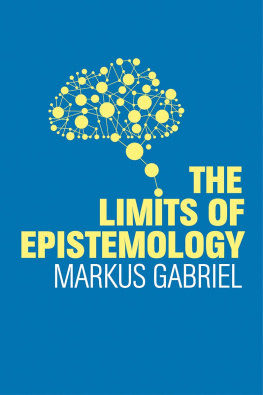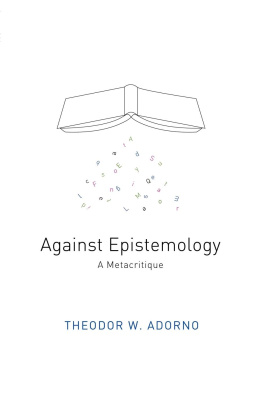Essays in Collective Epistemology
Jennifer Lackey
Margaret Gilbert and Daniel Pilchman
Rachael Briggs, Fabrizio Cariani, Kenny Easwaran, and Branden Fitelson
Introduction
Jennifer Lackey
Collective entities are the subjects of a variety of epistemic evaluations. For instance, we routinely cite such entities as the source of the knowledge that we possess. I may say, I found out from the American Kennel Club that the Labrador retriever is the most popular purebred dog in the United States, or I learned from Wikipedia that Abraham Lincoln died on April 15, 1865. The most natural interpretation of these claims is that we can acquire knowledge via collective testimony. Collective entities themselves are also often commonly said to believe or know things. For instance, the following was reported in a recent article in Daily Finance about Borders lagging behind its competitors with respect to the e-book market: Armed with data on 38 million customers, Borders believes it will easily capture market share (Daily Finance, July 7, 2010, emphasis added). Similarly, a recent story about the Gulf oil spill in Reuters writes, Long before the oil spill in the Gulf of Mexico in 2010, BP (BP.L) knew its Macondo well could explode and then lied about how much oil leaked (Reuters, September 30, 2013, emphasis added). The most straightforward reading of these claims countenances the phenomena ofcollective belief, collective epistemic justification, and collective knowledge.
Moreover, there are often enormously significant consequences that follow from the presence, or absence, of these phenomena. For instance, if BP did in fact know that a safety device was faultyone that, if repaired, could have prevented the oil spill in the Gulf of Mexicothen its negligence is significantly greater than if it didnt know this. This, in turn, might make an enormous difference to BPs moral and legal responsibilities. Here is another case: if the Bush Administration justifiedly believed that Iraq did not have weapons of mass destruction, then not only did the Administration lie to the public in saying that it did, but it is also fully culpable for of the hundreds of thousands of lives needlessly lost in the Iraq war.
Despite the widespread occurrence and importance of such epistemic attributions to collective entities, there is surprisingly little philosophical work shedding (p.2) light on these phenomena, their consequences, and the broader implications that follow for epistemology in general. Essays in Collective Epistemology aims to fill this gap in the literature by bringing together new papers in this area by some of the leading figures in social epistemology.
Background and Summaries
One of the central debates in collective epistemology is between summativists and non-summativists. According to summativism, collective phenomena can be understood entirely in terms of individual phenomena. So, for instance, a summative account of justified collective belief holds that a collective entity, E, justifiedly believes that p if and only if some of Es members justifiedly believe that p. A summative account of knowledge maintains that a collective entity, E, knows that p if and only if some of Es members know that p. This view is well positioned to capture some paradigmatic instances of collective epistemic phenomena. For instance, that Northwestern University justifiedly believes that its main campus is located in Evanston, IL can easily be explained by its members justifiedly believing this. That the Catholic Church knows that it does not permit women to be ordained as priests can be accounted for by its members knowing this.
Summativism has come under attack in recent years however, primarily through what are known asdivergence arguments. Divergence arguments purport to show that there can be a divergence between phenomena at the collective level and the corresponding phenomena at the individual level. So, for instance, a divergence argument against a summative account of justified collective belief holds that a collective entity, E, can justifiedly believe that p, despite the fact that not a single member of E justifiedly believes that p. Similarly, such an argument challenging a summative view of collective knowledge claims that a collective entity, E, can know that p, despite the fact not a single individual member of E knows that p.
These arguments are taken to support non-summativism, according to which collective phenomena are not understood in terms of individual phenomena. Instead, a collective entity, E, is an epistemic subject in its own right, one whose justifiedly believing or knowing that p is over and above, or otherwise distinct from, the individual members of G justifiedly believing or knowing that p. A standard type of case said to support this view with respect to collective justification is as follows:
A jury is deliberating about whether the defendant in a murder trial is innocent or guilty. Each member of the jury is privy to evidence that the defendant was seen fleeing the scene of the crime with blood spatter on his clothes, but it is grounded in hearsay that, though reliable, was ruled as inadmissible by the judge. Given only the admissible evidence, the (p.3) jury as a group justifiedly believes that the defendant is innocent, but not a single juror justifiedly believes this proposition because it is defeated for each of them as individuals by the relevant reliable hearsay evidence.
Cases of this sort are prevalent in the collective epistemology literature, but Schmitt (1995) provides a particularly detailed version. According to Schmitt, different evidence cases successfully function as divergence arguments only when they involve chartered groups, where [a] chartered group is one founded to perform a particular action or actions of a certain kind, and has no life apart from its office (1995, pp. 2723). In other words, chartered groups must function only in their offices or risk ceasing to exist. The U.S. Congress, the Sierra Club, and juries are all groups of this sort. Moreover, given the particular charter of a group, it may be governed by special epistemic standards, such as the exclusion of hearsay in a court of law. Because of this,
...a nonlegal group may fail to be justified in a belief because a member possesses countervailing hearsay. A court, on the other hand, would not lose its justification merely because a member possesses countervailing hearsay. And this is because in its legal capacity, the court rightly excludes hearsay, and its legal capacity is the only capacity in which it operates. (Schmitt 1995, p. 274)
Since the jury in the above case is a chartered group, Schmitt argues that its charter prohibits it from considering the hearsay evidence about the defendant fleeing the scene of the crime with blood spatter on his clothes. Without this crucial testimony, the jury justifiedly believes that the defendant is innocent of the murder in question. But since the jurors








